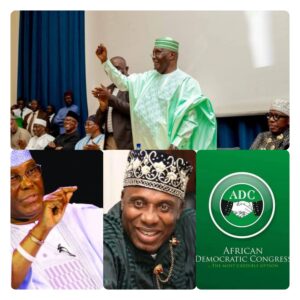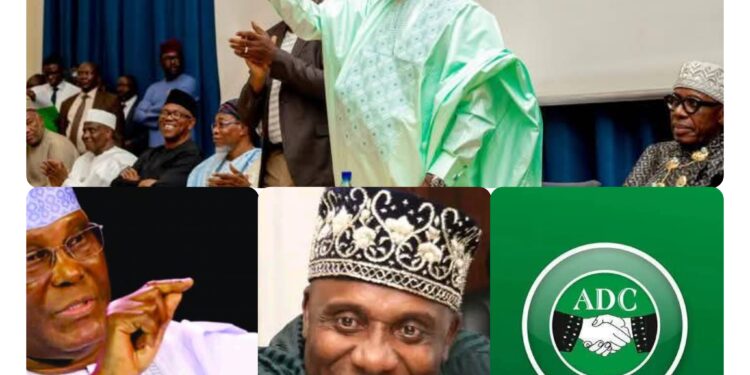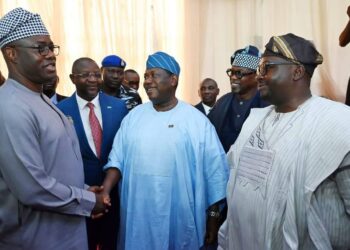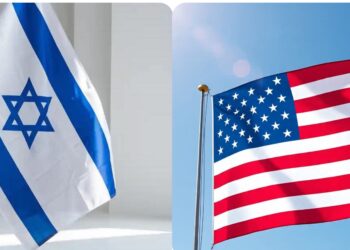With Atiku’s presidential ambition and Amaechi’s Rivers influence converging in the ADC, 2027 could challenge Nigeria’s two-party dominance like never before

By Ibrahim Kegbegbe
As Nigeria edges toward the 2027 general elections, the nation’s political chessboard is beginning to take shape. One of the most intriguing developments is the quiet but significant coalition that has repositioned former Vice President Atiku Abubakar and former Minister of Transportation, Rotimi Amaechi, inside the African Democratic Congress (ADC).
While Atiku’s presidential ambition is an open secret to Nigerians—having contested six times in the past—Amaechi’s move within the ADC is stirring speculations. Reliable insiders confirm that Amaechi intends to contest the presidential primary of the party, though many believe he could eventually emerge as Atiku’s running mate in a strategic realignment.
Lessons From 2023: Wike’s Frustrated Bid
The unfolding scenario brings back memories of the 2023 election cycle. Then, Rivers State’s strongman, Nyesom Wike, lobbied intensely to become Atiku’s running mate under the Peoples Democratic Party (PDP). However, Atiku opted for Delta State’s Ifeanyi Okowa, a decision that triggered the rebellion of the G5 Governors led by Wike, fracturing the PDP and weakening Atiku’s chances at the polls.
Today, the stakes in Rivers State remain high. Analysts argue that Atiku may attempt to correct that political miscalculation by choosing a heavyweight from Rivers. As one Abuja-based political commentator, Dr. Aliu Umar, observed: “Rivers is not just a vote basket; it is a political symbol. Whoever secures Rivers’ loyalty gains moral and electoral momentum in the South-South.”
The Amaechi Advantage
Amaechi, unlike Wike, has a long political résumé: two-term Governor, former Speaker of the Rivers State House of Assembly, and two-time Director-General of Muhammadu Buhari’s presidential campaigns. Though he served as a key figure in the All Progressives Congress (APC), his eventual fallout with the ruling party has left him exploring fresh options.
“An Atiku–Amaechi ticket under the ADC would be formidable,” noted Chief Emmanuel Isaac, a Port Harcourt-based political elder. “Amaechi commands respect beyond Rivers; he has networks in the North from his time with Buhari, and Atiku is already a household name across the country.”
ADC: From Fringe to the Spotlight
Founded in 2006, the ADC has long been considered a fringe party, often attracting technocrats and reform-minded candidates without the deep structures to challenge the APC and PDP. But the recent coalition that brought in heavyweights like Atiku and Amaechi has altered its profile. The party now positions itself as the long-awaited “third force” capable of breaking Nigeria’s two-party deadlock.
Former President Olusegun Obasanjo once endorsed the ADC as a platform for credible leadership, and political observers suggest that the party may finally be finding its footing with the entrance of Atiku and Amaechi.
Rivers as the Decider
Among political gladiators, there is a recurring theory: any presidential ticket that includes a Rivers heavyweight stands a higher chance of victory. The state, rich in oil revenue and symbolic in the South-South, has proven decisive in past elections.
A Lagos-based political analyst, Mrs. Titi Williams, argued: “In 2023, Tinubu benefited from Wike’s quiet support in Rivers. If Atiku can bring Amaechi on board, he will not only divide Rivers but also neutralize Wike’s influence. That could tilt the balance in a tightly contested election.”
READ ALSO:Why Printing More Money Can Make Nigerians Poorer
History as a Guide: Strategic Balancing Works
Nigeria’s political history repeatedly shows that running mates are not afterthoughts—they often determine victory. In 1993, Chief Moshood Abiola’s alliance with Babagana Kingibe in the annulled election created a North–South balance that gave their Social Democratic Party a national spread. In 1999, President Olusegun Obasanjo chose Atiku Abubakar from the North as his deputy, a masterstroke that consolidated PDP’s dominance for years.
Similarly, Muhammadu Buhari’s pairing with Yemi Osinbajo in 2015 brought together the North and the South-West, reassuring Christians and moderates while consolidating votes across regional divides. The Buhari–Osinbajo ticket broke PDP’s 16-year hold on power.
As Alhaji Kabiru Yakasai, an elder statesman, recently remarked: “In Nigerian politics, alliances win elections, not individuals. If Atiku and Amaechi unite under the ADC, the old order may be in trouble.”
A Gamble or a Masterstroke?
Still, much remains uncertain. Amaechi is reportedly eyeing the ADC presidential ticket himself, and whether he will settle for the vice-presidential slot remains to be seen. Atiku, on the other hand, is widely believed to be the frontrunner within the party’s new coalition. The coming months will determine whether this budding alliance holds or fractures under ambition.
READ ALSO:Aregbesola Receives PDP, Labour Party Stalwarts into ADC, Declares Party Ready for 2027
What is clear is that the 2027 elections may test the traditional dominance of APC and PDP like never before. If Atiku emerges with Amaechi on the ticket, Rivers State could once again prove to be the swing factor in Nigeria’s political destiny.
Ibrahim Kegbegbe is a journalist and public affairs analyst. He writes from Lagos.
















